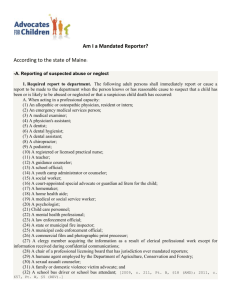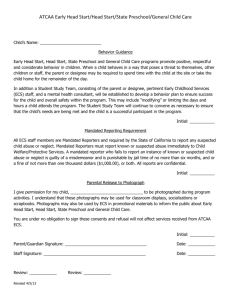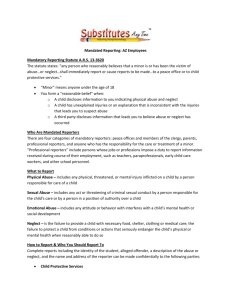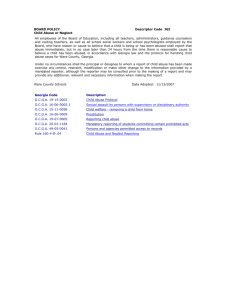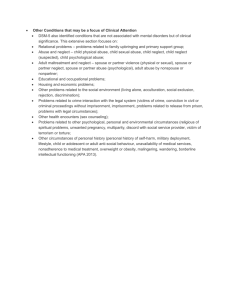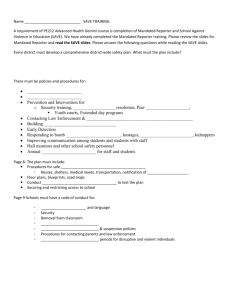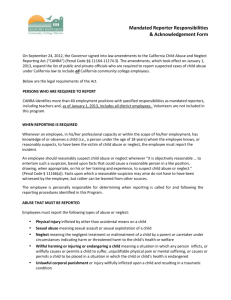STATE OF CALIFORNIA
advertisement
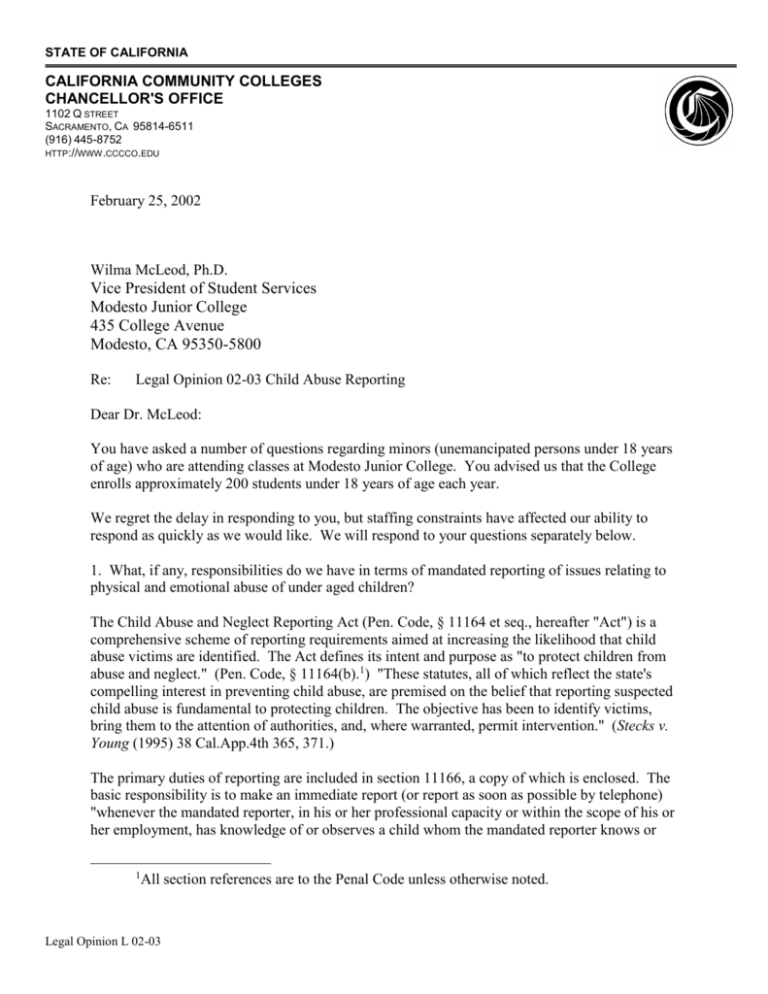
STATE OF CALIFORNIA CALIFORNIA COMMUNITY COLLEGES CHANCELLOR'S OFFICE 1102 Q STREET SACRAMENTO, CA 95814-6511 (916) 445-8752 HTTP://WWW .CCCCO.EDU February 25, 2002 Wilma McLeod, Ph.D. Vice President of Student Services Modesto Junior College 435 College Avenue Modesto, CA 95350-5800 Re: Legal Opinion 02-03 Child Abuse Reporting Dear Dr. McLeod: You have asked a number of questions regarding minors (unemancipated persons under 18 years of age) who are attending classes at Modesto Junior College. You advised us that the College enrolls approximately 200 students under 18 years of age each year. We regret the delay in responding to you, but staffing constraints have affected our ability to respond as quickly as we would like. We will respond to your questions separately below. 1. What, if any, responsibilities do we have in terms of mandated reporting of issues relating to physical and emotional abuse of under aged children? The Child Abuse and Neglect Reporting Act (Pen. Code, § 11164 et seq., hereafter "Act") is a comprehensive scheme of reporting requirements aimed at increasing the likelihood that child abuse victims are identified. The Act defines its intent and purpose as "to protect children from abuse and neglect." (Pen. Code, § 11164(b).1) "These statutes, all of which reflect the state's compelling interest in preventing child abuse, are premised on the belief that reporting suspected child abuse is fundamental to protecting children. The objective has been to identify victims, bring them to the attention of authorities, and, where warranted, permit intervention." (Stecks v. Young (1995) 38 Cal.App.4th 365, 371.) The primary duties of reporting are included in section 11166, a copy of which is enclosed. The basic responsibility is to make an immediate report (or report as soon as possible by telephone) "whenever the mandated reporter, in his or her professional capacity or within the scope of his or her employment, has knowledge of or observes a child whom the mandated reporter knows or 1 All section references are to the Penal Code unless otherwise noted. Legal Opinion L 02-03 Wilma McLeod, Ph.D. 2 February 25, 2002 reasonably suspects has been the victim of child abuse or neglect." (Section 11166(a).) The Act requires that suspected child abuse and neglect be reported by mandated reporters to the county welfare department or any police, sheriff, or county probation department that is designated by the county to receive mandated reports. If the report is made by telephone, the mandated reporter must prepare and send a written report within 36 hours of receiving the information. Persons who are mandated reporters must report as required. Other persons, who are not mandated reporters, but who have knowledge of or observe a child whom they know or reasonably suspect has been a victim of child abuse or neglect may report the abuse to the above agencies. Employers of mandated reporters are required to ensure that such employees know their obligations under the Act. Thus, "any mandated reporter . . . prior to commencing his or her employment, and as a prerequisite to that employment, shall sign a statement on a form provided to him or her by his or her employer to the effect that he or she has knowledge of the provisions of Section 11166 and will comply with those provisions." (Section 11166.5(a).) Generally, the Act provides absolute immunity for mandated reporters from civil or criminal liability for making the required or authorized report. (Section 11172(a).) If mandated reporters fail to make required reports of incidents of known or suspected child abuse and neglect, they may be subject to criminal prosecution. (Section 11166(b).) A nonmandated reporter of known or suspected child abuse or neglect also has immunity from civil and criminal liability unless there is proof that the reporter made the report knowing that the report was false or made the report with reckless disregard for the truth or falsity of the report. (Section 11172(a).) 2. What members of the campus community are mandated reporters? We enclose for your information a copy of section 11165.7 which lists all mandated reporters. As you will note, the definition of "mandated reporter" includes "teacher." We are aware that the words that are used in the Penal Code seem to reflect a K-12 structure more than a community college structure. For example, community colleges are typically referred to as "colleges," not "schools." Community colleges usually refer to "faculty" or "instructors," not "teachers." However, we believe that words like "schools" and "teachers," as used in identifying mandated reporters under the Act, should be broadly construed to give effect to the purpose and intent of the Act. Therefore, "teachers" would include community college instructors who are in a position to observe child abuse and neglect. A broad interpretation of "teacher" is consistent with the 1989 conclusions of the California Attorney General who considered whether a teacher of ballet at a private ballet school was required to report instances of child abuse under the Act. (72 Ops.Cal.Atty.Gen. 216 (1989).) At the time, the Act defined "child care custodians" who had a duty to report instances of known or suspected child abuse, as opposed to the current term of "mandated reporter." Legal Opinion L 02-03 Wilma McLeod, Ph.D. 3 February 25, 2002 The private ballet school held an "Authorization to Operate as a Private Postsecondary Educational Institution" issued by the California Department of Education, and met the federal Department of Health, Education and Welfare's definition of an "institution of higher education." The school accepted students beginning at eight years of age as well as persons in adult classes. The school focused on preparation for performance as opposed to "academic" instruction, and the instructors were primarily former professional ballet dancers. In addition, the school conducted introductory dance sessions/classes at local public schools. The Attorney General noted that the purpose of the Act was "to detect and prevent child abuse." The ballet school teacher was thus "in daily contact with persons under the age of eighteen. It would also seem fair to say that because of the nature of ballet classes, the ballet teacher would be in a special position to observe instances of child abuse." (72 Ops.Cal.Atty.Gen. at p. 218.) However, the Attorney General still looked to the language of the Act to determine if the ballet teacher should be included within the scope of "teacher" under the Act. Because "teacher" was not defined in the Act itself, the Attorney General concluded that the term must be interpreted "according to its usual, ordinary and generally accepted meaning" and noted that the Act was not limited as to "particular subjects, knowledge, or skills." (Id. at p. 221.) The Attorney General also noted: "Without intending to suggest that the meaning of the word 'teacher' as found in the Act is without bounds and mandates a reporting duty on any person who happens to impart some knowledge or skill to a child, we do not accept the proffered limitation that it applies only to teachers in K-12 schools. We find nothing in the statutory language of the Child Abuse and Neglect Reporting Act to support such a limitation on the plain meaning of the word 'teacher.' Second, it bears noting that the particular private Ballet School that has been described does not operate free from all governmental oversight. It is 'licensed' by a state agency to operate as a Private Postsecondary Educational Institution in California . . . and its credentials permit it to participate in the Student Tuition Recovery Fund and to apply for other student financial assistance programs. In its operation, it deals with students as young as eight years of age, whom it owes as much a duty of care and supervision as does a public or private K-12 school." (Id. at p. 225.) The Attorney General expressly rejected the notion that the type of academic preparation of the teachers affected their inclusion: "But most important, we cannot accept the notion that a ballet teacher at the School would not be a type of trained 'professional' upon whose judgment and experience the Legislature relied to report known or suspected instances of child abuse. Such a person is professionally in contact with children on a regular and continuous basis . . . and deals with them in a setting where evidence of child abuse may be uniquely readily apparent." (Id. at p. 225.) The private nature of the institution was rejected as a basis for exclusion from coverage Legal Opinion L 02-03 Wilma McLeod, Ph.D. 4 February 25, 2002 by the Act. The Attorney General concluded: ". . . a person who teaches ballet at a private ballet school is a 'teacher' and thus a 'child care custodian' as defined by the Act, and therefore has a mandatory duty to report instances of child abuse under it." (Id. at p. 226.) The Attorney General noted that the types of persons who were required to report child abuse had expanded over the years: in the beginning only physicians were required to report. Indeed, after the Attorney General's 1989 opinion, the scope of mandated reporters has been significantly expanded. At present, it includes such persons as district attorney investigators, firefighters, animal control officers, and even commercial film processors. Based on the scope and purpose of the Act, its legislative development, and the Attorney General's analysis that underscores professional contact with children, we conclude that it applies to those community college "teachers" whose scope of employment places them professionally in contact with children on a regular and continuous basis where evidence of child abuse or neglect would be readily apparent. Based on similar reasoning, we believe that "classified employee[s] of any public school," who are included by section 11165.7(a)(4) as mandated reporters, includes community college district classified employees if their scope of employment places them in similar contact with children on a regular and continuous basis such that evidence of child abuse or neglect would be readily apparent. In addition to community college instructors and classified employees whose duties place them in a position to observe potential instances of child abuse or neglect, the Act applies to community college counselors. Education Code section 72621 addresses the confidentiality of information disclosed during student counseling. This section provides in pertinent part: "Any information of a personal nature disclosed by a student 12 years of age or older in the process of receiving counseling from a school counselor as specified in section 72620 is confidential. Any information of a personal nature disclosed to a school counselor by a parent or guardian of the student who is 12 years of age or older and who is in the process of receiving counseling from a school counselor specified in section 72620 is confidential. The information shall not become part of the student record, as defined in section 76210, without the written consent of the person who disclosed the confidential information. The information shall not be revealed, released, discussed, or referred to, except as follows: . . . (b) Reporting of child abuse or neglect as required by Article 2.5 (commencing with Section 11165) of Chapter 2 of Title 1 of Part 4 of the Penal Code." (Emphasis added.) We read the foregoing as establishing the basic confidentiality requirement that in turn is subject to "required" reporting under the Act. If counselors were not otherwise required by the Act to report child abuse and neglect, the exception noted above would not refer to the requirement to report. (We also note that K-12 counselors are subject to a similar exception from the confidentiality requirement when child abuse or neglect is involved. See, Ed. Code, § 49602.) Legal Opinion L 02-03 Wilma McLeod, Ph.D. 5 February 25, 2002 Finally, in 1991, the Act was amended to add the following individuals to the list of those who must report under the Act: "administrator[s] or employee[s] of a public or private organization whose duties require direct contact and supervision of children." (Ed. Code, § 11165.7(a)(8).) This addition is broad enough to encompass all community college employees whose scope of duties fit within that definition. Although you have not specifically asked about College obligations concerning the reporting requirements, we want to point out the provisions of section 11166.5(a): "(a) On and after January 1, 1985, any mandated reporter as specified in Section 11165.7, with the exception of child visitation monitors, prior to commencing his or her employment, and as a prerequisite to that employment, shall sign a statement on a form provided to him or her by his or her employer to the effect that he or she has knowledge of the provisions of Section 11166 and will comply with those provisions. The statement shall inform the employee that he or she is a mandated reporter and inform the employee of his or her reporting obligations under Section 11166. The employer shall provide a copy of Sections 11165.7 and 11166 to the employee." 3. What processes must we have in place to give notice to students (potential victims or suspects) of our reporting requirements? The Act does not provide for a specific notice regarding reporting under the Act to potential victims or suspects. 4. What are the reporting or notification requirements for registered sexual offenders? Do we have a requirement to inform students that sexual offenders might be participants in campus activities and events including overnight travel for field trips or extracurricular activities? Before addressing your specific questions, we recognize that our system is a very inclusive one which makes itself available to a wide variety of individuals. The admission system does not generally question students about their backgrounds, their motives for attending college, or their conduct that does not directly affect college attendance or activities. While it is expected that the vast majority of students present no particular risks to other students, the same open access that gives the system its uniqueness may embrace persons whom other students, and particularly younger students, may be surprised to encounter. Apart from advising students of the potential presence of sex offenders, we believe there is merit in informing younger students who may be contemplating attendance of a variety of realities of attending college so as to frame reasonable expectations and to maximize the potential for student success. For example, younger students may not fully understand the rigors of college-level work, that pedagogical reasons may lead to Legal Opinion L 02-03 Wilma McLeod, Ph.D. 6 February 25, 2002 the use of course materials that some students may find offensive, and that they are held to the same academic and conduct requirements as all other students. Your inquiry regarding reporting or notification requirements requires a review of recent federal and state law. The federal "Campus Sex Crimes Prevention Act" was enacted on October 28, 2000. It amended three federal laws and triggered a recent addition to California law. The "Campus Sex Crimes and Prevention Act" amended the "Jacob Wetterling Crimes Against Children and Sexually Violent Offender Registration Act" to require those sex offenders who are required to register in the state to also register, in accordance with state law, at institutions of higher education where the person is enrolled as a student, is employed, or carries on a vocation. The amendment takes effect October 28, 2002. For a number of years, federal law has required colleges that receive federal aid to collect statistics about crime, to file annual crime reports with the federal government, and to provide certain notices to students. This law, the "Jeanne Clery Disclosure of Campus Security Policy and Campus Crime Statistics Act," (20 U.S.C. § 1092(f)(1) was also amended by the "Campus Sex Crimes Prevention Act." The amendment, effective October 28, 2002, requires colleges to include the following notice: "A statement advising the campus community where law enforcement agency information provided by a State under section 14071(j) of Title 42, concerning registered sex offenders may be obtained, such as the law enforcement office of the institution, a local law enforcement agency with jurisdiction for the campus, or a computer network address." The notices must be included in the annual report due in October, 2003. The "Campus Sex Crimes and Prevention Act" also amended the federal "Family Educational Rights and Privacy Act" (FERPA), which generally prohibits the release of student educational records without either a court order or the consent of the student about whom they pertain. The FERPA amendments are already in effect so as to permit schools to release registered sex offender information. (20 U.S.C. § 1232g(b)(7)(A).) In response to the federal requirements that state law describe the expanded registration requirements for convicted sex offenders, Assembly Bill 4 was passed by the Legislature and signed by the Governor. (Stats. 2001, ch. 544.) That bill added section 290.01 to the Penal Code. Presently, persons who are required to register as sex offenders must register in the communities in which they live. If they reside on campus, they must register with the chief of police of the Legal Opinion L 02-03 Wilma McLeod, Ph.D. 7 February 25, 2002 campus where they reside. (§ 290.2) Although information about registered sex offenders is generally not available to the public, important exceptions apply. Police may release extensive information about the individual, including that person's enrollment, employment or vocational status with a community college district if the information is "relevant and necessary to protect the public," if the information relates to a "high-risk sex offender," or if a member of the public provides an "articulable purpose" for access to the information. (§ 290(m) and (n), § 290.4.) Pursuant to newly added section 290.01, which takes effect October 28, 2002, to correspond with the effective dates of the provisions described above, registered sex offenders must also register with campus police if they are enrolled as students at community colleges, are employees of community colleges (with or without compensation), or carry on a vocation at a community college for more than 14 days or an aggregate of 30 days in a calendar year. Volunteers are also covered. Thus, the registration requirement that affects only persons who live on campus is greatly expanded. A registrant has 5 working days from beginning enrollment or employment in which to register, and must also notify the campus police department upon ceasing the activity (e.g., employment) that required the registration. The first violation of the registration requirements is a misdemeanor carrying a fine of not more than $1,000. The second violation is also a misdemeanor with a fine of not more than $1,000 and/or county jail imprisonment for not more than 6 months. A third or subsequent violation is a misdemeanor, punishable by a fine not to exceed $1,000 and/or county jail imprisonment for not more than 1 year. (§ 290.01.) We hope the foregoing information is useful to you. Sincerely, Virginia Riegel Staff Counsel L 02-03 VAR:sj Attachment 2 A full analysis of all portions of section 290 is beyond the scope of this opinion. Legal Opinion L 02-03
